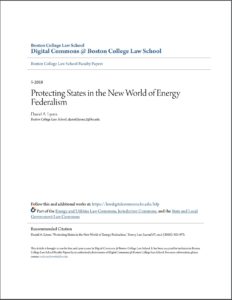Full Title: Protecting States in the New World of Energy Federalism
Author(s): Daniel A. Lyons
Publisher(s): Boston College Law School
Publication Date: May 1, 2018
Full Text: Download Resource
Description (excerpt):
In a trilogy of recent cases, the Supreme Court has launched a quiet revolution in energy federalism. With little fanfare, it has abandoned its decades-long effort to divide electricity regulation into mutually exclusive spheres of federal and state authority. Instead, it has embraced a more sophisticated concurrent jurisdiction model—against the wishes of Justice Scalia, who opposed this transformation in his final published dissent.
This Article explores the ramifications of this revolution, particularly for state energy regulators. The shift to concurrent jurisdiction is long overdue. The historic model of the local vertically integrated utility has long been
replaced by regional, complex, innovative electricity markets. Concurrent jurisdiction allows regulators to adapt more nimbly to changing market dynamics, unrestrained by the outdated formalism of the old dual federalism model.
But this shift raises important questions regarding how states can remain relevant in an increasingly complex regulatory environment without the judicial safeguards that the dual federalism model once provided. States
remain vital sources of local knowledge, experimentation, and expertise. But in this brave new world of concurrent jurisdiction, federalism-related disputes are more likely to be settled in the political arena than in the courtroom—an arena where federal authorities have the advantage. Drawing upon recent scholarship in negotiation theory and dynamic federalism, this Article discusses ways that state officials can, and do, negotiate with their federal counterparts to maintain influence over energy policy decisions. It also highlights procedural reforms that would improve the robustness and effectiveness of negotiations between state and federal officials in the
